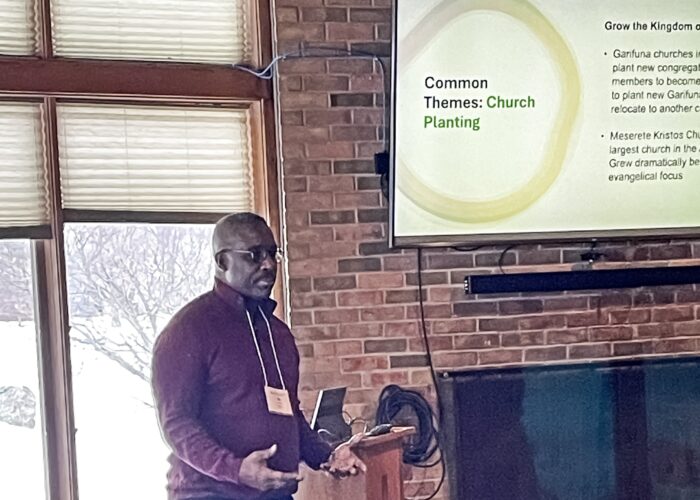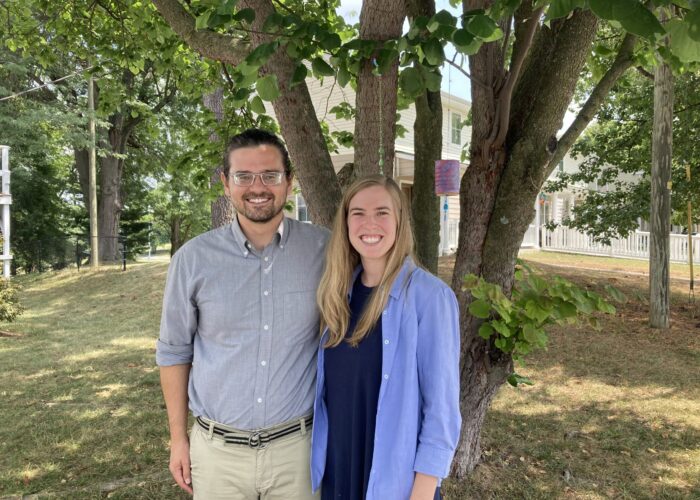ELKHART, Indiana (Africa Inter-Mennonite Mission/Mennonite Mission Network) – In a land that closely resembles the place Jesus lived more than 2,000 years ago, his words still prove true. The people of Sidi, Burkina Faso, plant their fields with the tools and methods described in the New Testament. They draw water from wells, and feed their families with crops they harvest. Some of them live by Jesus’ teaching, recorded in Matthew 5:44: "Love your enemies, and pray for those who persecute you."
In the planting season of June 2015, members of the Mennonite Church in Sidi discerned that God was calling them to renounce the time-honored annual sacrifices to the ancestors to ensure a bountiful harvest. Traditionally, the land is not sold, or rented; it is allotted by the land chiefs to people who work it to feed their families. Before receiving a farming plot, each family must offer a live chicken and four liters of dolo, a locally made millet beer, to the spirits of the land.
Seydou Sanogo settled in Sidi 17 years ago. Because he was the only Christian in the village, he would go to worship in neighboring Banzon. After an evangelistic campaign in 2011, more people became Christians and a congregation, Eglise Evangélique du Burkina Faso (Evangelical Mennonite Church of Burkina Faso), began to meet in Sidi. The village leaders granted land to the Christians to build their place of worship.
In the beginning, the Christians complied with all the traditional conditions for the use of the land, but as the Mennonite church grew in numbers, and as their faith deepened, the Christians began to see their fertility offerings to guarantee a good harvest as a contradiction to trust in God’s providence, and they refused to continue participating in these rites.
In an attempt to live more faithfully, the Mennonites proposed a thank-you gift to the village leaders. They would bring produce from their farms, and money, instead of customary offerings. Then it would be up to the village leaders to decide how to use these gifts. This proposal was not well received by the leaders. They perceived the suggestion as an act of disobedience on the part of the Christians, and accused them of breaking their original promise to abide by the conditions for land use.
The village leaders said that if they allowed the Christians to break the solidarity that bound the community together, this would open the door for others to disregard the traditional laws also.
Salif, Sidi’s traditional land chief, threatened to chase the Christians out of the village. He even proposed to kill them.
The leaders of Eglise Evangélique Mennonite du Burkina Faso attempted to gain protection for the believers from the préfet, the regional political authority, but the préfet refused to use his position to benefit the Christians. The Mennonites wanted to send a pastor, Emmanuel Coulibaly, to lead the embattled congregation, but Sidi’s leaders refused. So, Coulibaly took up residence in Fon, a village about six miles from Sidi, and regularly visits the Sidi Christians and encourages them to stay strong in their commitment to Jesus.
By God’s grace, Salif never followed through on his threat to expulse the Christians from the village, and they were able to harvest their crops. During the harvest time, the Christians were inspired to offer to help Salif harvest his cotton crop. He accepted!
This act of love and humility broke through the hostility that Salif had for the Christians. When he accepted the Christians’ offer to help him with his field, he was recognizing that they are part of his village.
Now, tension in the village has greatly diminished, and Christians are once again preparing to seed their crops this year. The believers meet regularly for worship in the church building Salif had threatened to destroy. Christians have demonstrated that love is stronger than violence and hate as they remained firm in loyalty to Jesus, who said, "Love your enemies, and pray for those who persecute you."
The Mennonites of Sidi are convinced that God is working through these difficulties to speak to their community. Their hope is to see the Sidi church grow. They also hope that those who have persecuted them will learn to know God, who is Love.



